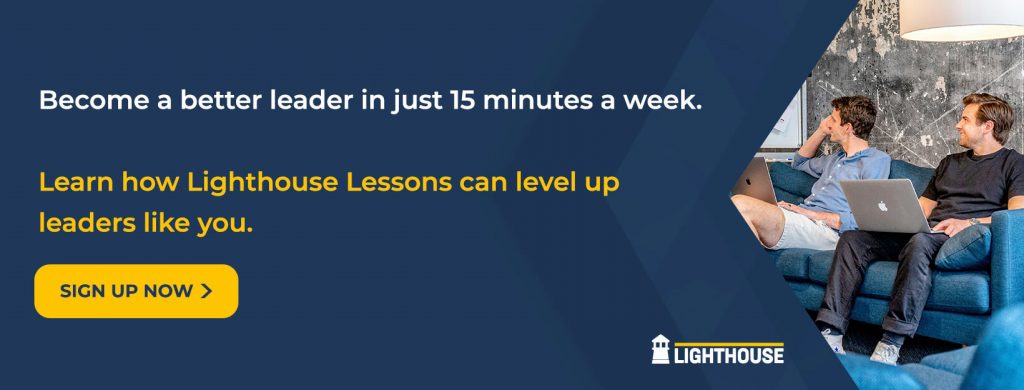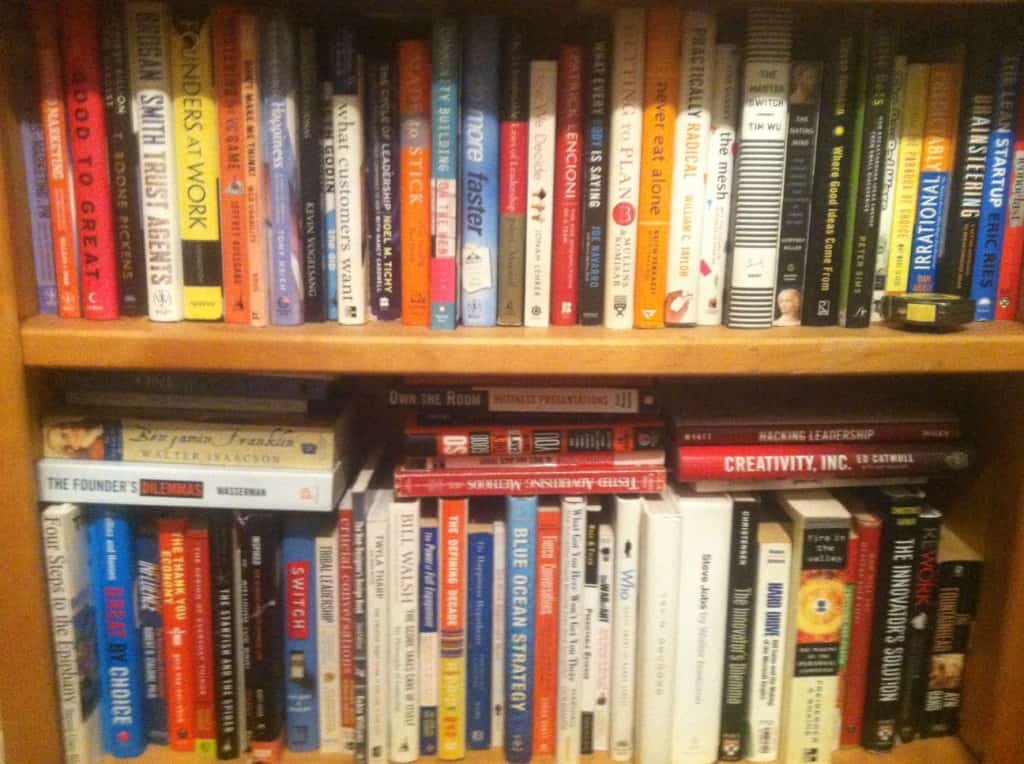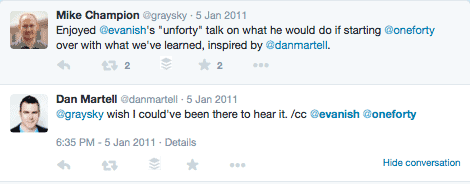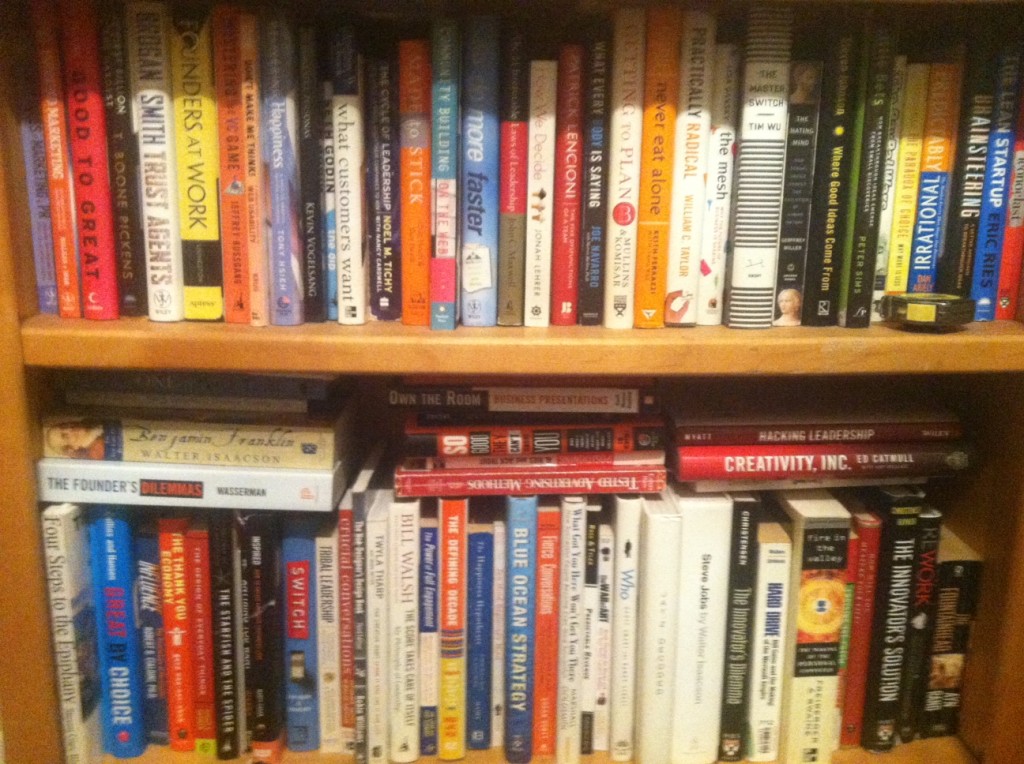"Only a fool learns from his own mistakes. The wise man learns from the mistakes of others." - Otto Von Bismarck
I've always loved this quote from the former Prime Minister of Prussia. I try to look for leadership lessons to learn all around me, whether they're good or bad.
Fortunately, not every lesson is a negative experience. Often, some of the best leadership lessons are what works.
In my career, I've been lucky enough to work with people that taught me some crucial lessons in how they interacted with and managed me and others around me. I'd like to highlight some of those leadership lessons so you can learn from them, too.
7 Key Leadership Lessons I Learned from My Managers
John Prendergast, Founder BlueLeaf
John gave me my first job in tech: An internship learning how to do doing customer development for his then just started company, BlueLeaf. John wanted to investigate a new business opportunity and saw me as a young, hungry person he could put on a project he didn't have time to execute on.
John taught me a lot of things in those four months interning for him, and one of the biggest was...
Leadership Lessons #1: Never have important conversations over email.
I tried to ask for a raise from him part way into the internship over email. He smartly asked that we have that conversation in real time. We had a very calm, reasoned conversation that never could have happened asynchronously over email.
Since then, I always try to catch myself before I send an email to a team member that would be better delivered in person.
Too much can get lost in writing especially when strong emotions are involved. Meanwhile, in person you can convey so much with body language and ensure that no one is left to stew on a response when it could have all been settled in a moment.
When I have feedback for a team member, I like to note what I want to talk to someone about and then work it into our next 1 on 1. I find there's no better time to deliver important coaching and feedback, especially since the natural flow of the meeting saves me making the awkward "sh*t sandwich" feedback format.

As my internship with John was winding down, a company he had invested in, oneforty, had just raised venture capital. He nudged the founder, Laura Fitton, to consider hiring me, which led to my first full time job in tech where I learned even more.
Laura Fitton, Founder oneforty
Back in 2009, no one knew what Twitter would become. It was exciting to see all the apps people were building on the API and Laura became an early expert.
This led Laura to start oneforty, the 3rd party app store for Twitter. When they raised $2 million in funding, I was lucky to be hired as customer development manager (essentially a junior Product Manager) to help understand our two sides of the marketplace and own analytics at the company.
There were many lessons working there and two management lessons stood out:
Leadership Lessons #2: Get mentors for everyone on your team.
Laura knew that I was young, hungry, and inexperienced when I started. She was busy with the incredible challenges of being a solo-founder, so she would not be able to provide a lot of mentorship. She also wasn't experienced in what I was hired for, so she got me two mentors who were.
Looking back, my luck was incredible as those mentors were none other than Hiten Shah and Dan Martell.
Once a month, I had a call with each of them, asking them all kinds of questions about analytics, customer development, lean startups, and more. These sessions helped me learn so much and level up so much faster than I could have learning on my own. The company also benefited a lot from my learnings.
You don't have to be as super-connected as Laura to do this for your team.
Anyone that's a step or two ahead of your team member can be a great mentor for them. You'll be amazed how often that person being asked will be honored, especially if they don't get to do it very often. Everyone wants to be a part of the success of others and their growth strengthens your team.
For example, there was a designer we tried to hire at Lighthouse, but we just couldn't afford them. They told me they'd love to help if they could in another way that working full time with us.
When we hired a young, hungry designer, I asked them to mentor that person. Just like Dan and Hiten leveled up my career, the mentor's guidance dramatically improved our designer's skills and the quality of their work. In fact, the designs were so good, our churn was cut in half when we launched a major redesign they had collaborated on.
Ask yourself: What mentor could you connect a team member to that would change their life, and transform the work they do for you?
Leadership Lessons #3: If you want someone to learn a concept fast, give them a good book.
Laura brought in a full bookshelf of books for the oneforty office. This made it easy to have any of us have a good book at our disposal when we needed to learn something.
As I've previously written about in our post on priority (not time) management, Laura wanted to work with me on having more accountability on ideas we discussed. This came via the book, The One Minute Manager Meets the Monkey by best-selling leadership author Ken Blanchard.
Rather than trying to teach me the concept, I was able to read in depth on the concept and start applying it to our work together, making sure that we always determined who had "the monkey on their back" (aka-ownership) of a project. This happened a number of times and always led to me improving in that area.
Books are an inexpensive, high return investment for you and your team. This is why companies like Twilio give employees a budget of $30/month for books every month and many times employees are gifting books to each other.
After I left oneforty, I worked on my own projects for awhile. During that time I kept in touch with one of my oneforty mentors, Hiten Shah, who was interested in a product management tool I was working on.
That project didn't work out, but it did lead to conversations with Hiten that led me to move to San Francisco to run product at KISSmetrics. Here I learned first hand what a growing startup was like.
Hiten Shah, Founder KISSmetrics
I came into KISSmetrics at an interesting time with the company. They had gone a few months since the last product manager, were transitioning to a local team in SF from being 100% remote, and were rapidly growing sales.
There was a lot of work to do, many challenges, and new experiences to learn from, including two great management lessons.
Leadership Lessons #4: Get out of the office for tough conversations.
No startup is totally smooth sailing. Moving to a new city where you barely know anyone is also a challenge.
Hiten and I had many crucial conversations over tea at Samovar or walking laps around Yerba Buena in downtown San Francisco. It helped a lot to get out of the office, get some fresh air, and new perspective.
Not every conversation is suited for a conference room, office, or hallway. Don't be afraid to take a walk or just meet somewhere outside the office. It can take the edge off a tough discussion and even be relaxing. Even Mark Zuckerberg has been known to take key recruits on a hike as part of his closing process to recruit people.
And once Lighthouse had its own office, we did the same; I would take team members out for a walk or to a coffee shop down the street. This helped relax everyone, and transition away from the hard work and hustle of startup life to have important discussions.
Leadership Lessons #5: Money is not what makes work meaningful.
During my time at KISSmetrics, my happiest moments were not when I got bonuses or a raise. In fact, bonuses felt more like a relief than a moment of triumph, because I was working hard.
Instead, my favorite moments were when I was learning, working on something meaningful, and enjoying the process.
I recall in particular a night when we were working on the My Analytics app design. Hiten and I had been going back and forth a ton on different UI elements we could integrate into the app.
We had downloaded all the apps that helped you add text to your photos and compared what we liked about them. I was just getting into mobile product work and it was a lot of fun learning from Hiten and exploring new possibilities.
You need to pay people enough to live, but then it's no longer the key driver for most people. This is at the center of Dan Pink's triad of concepts of Autonomy, Mastery and Purpose he discusses in his TED talk. If you can help people feel fulfilled in their work and learning new skills, you'll see them more engaged and happy than any bonus can.
It was after KISSmetrics that I started Lighthouse, so for the last set of leadership lessons, I look back at someone who was not my manager.
Instead, they led the company I worked for while I was in grad school.
Russ Wilcox, Founder E Ink
When I was fresh out of undergrad and had a summer off before starting a year of grad school, I interned at E Ink, who make the display screens for the e-readers like the Amazon Kindle.
While I worked there, I emailed the CEO asking if I could have 20 minutes of his time to ask him questions about entrepreneurship. During our 1 hour meeting (he was quite generous), he shared a lot of insights, two of which are great leadership lessons.
Leadership Lessons #6: Read 100 Books.
One of the first pieces of advice Russ gave me was to "read 100 books." At the time that seemed like an insurmountable number, but there's a surprising depth in that simple suggestion.
Now, as an eager, very green grade student, my next question was "Which books??", planning to frantically write down all his recommendations.
Instead, he laughed and wisely told me it actually doesn't matter.
If you read 5-10 books on every subject that matters to your career (like sales, marketing, soft skills, and culture), you'll pick up the most important concepts that they all talk about, plus individual nuggets of wisdom from each of them. If you then apply those concepts at work, you'll see over time which ones work best in various situations.
Also, by reading 100 books, you have the opportunity to become well read on a variety of subjects; this prepares you for many situations you will encounter both socially and professionally.
Most importantly, after reading that many books, you will have jump started your career unlike anything else. Someone who reads regularly will be years ahead of someone learning only from their own experience.
Finally, to read that many books, you have to build a great routine that will stick with you. I've been reading on the subway and other public transportation for years and now I feel naked without a book with me when I go out.
This has helped me keep a pace of 25 books a year no matter what else is happening in my life, and because of that, I'm always learning new things.
At this point, I've stopped counting, but before I did I actually doubled Russ's recommendation, and it's had every positive impact that he predicted. I have a firm understanding of the fundamentals on many topics, and plenty of resources to call on when I'm facing a challenge.
If you're looking for some ideas of which books to read, you can find out my favorites (and a few to avoid) with these links:
- See my list of 200+ books I've read over the years across topics with ratings and reviews.
- Specifically on the subject of leadership lessons, here's the best leadership books for managers.
Leadership Lessons #7: Have a higher purpose to the work that you do.
Russ has an amazing quote that has stuck with me since I first heard him say it:
"You live to your fullest potential when you pursue a challenging dream that builds lasting value for others.” -Russ Wilcox
For Russ, that was building E Ink to change the publishing industry so anyone could access a book, any time, anywhere. Now, he's on the board of directors of a company working on a nuclear power startup trying to use nuclear waste to generate power. Inspiring stuff.
This has challenged me to evaluate the companies I work at and projects I work on. I want to feel like I'm contributing to something meaningful.
I felt oneforty was helping 3rd party developers succeed on a new communication medium, and at KISSmetrics, we were using data and analytics to help businesses grow and succeed. Now, with Lighthouse, I'm helping managers be more effective and helping everyone have managers they like working for. It really helps drive me as I slog through tough days.
What lessons have you learned from those you've worked for?












